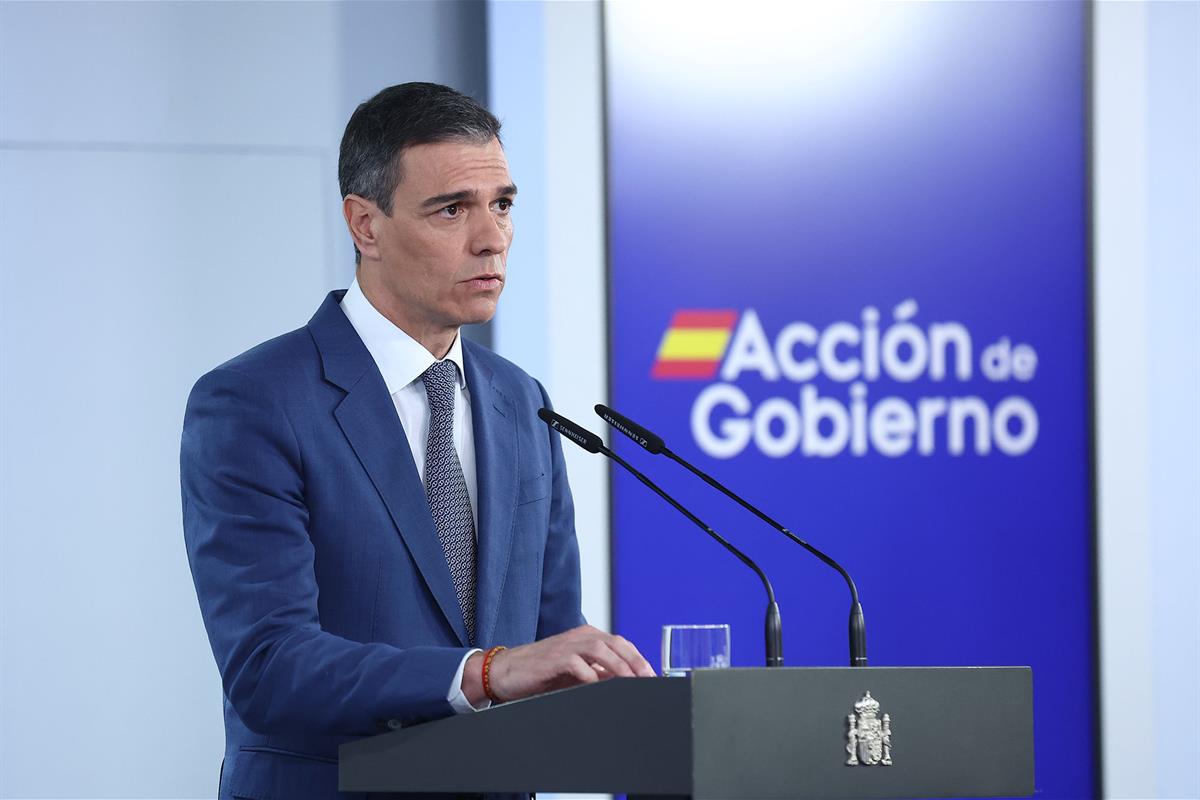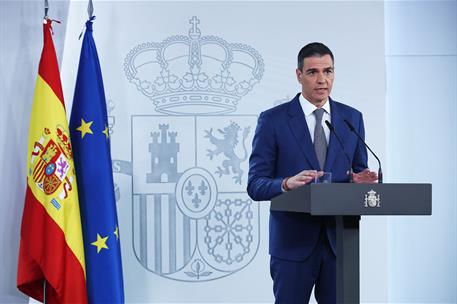Pedro Sánchez announces that "almost 50% of the national electricity supply has been re-established"
President's News - 2025.4.28
Moncloa Palace, Madrid
 The President of the Government of Spain, Pedro Sánchez, appears to report on the electricity supply situation (Pool Moncloa / Fernando Calvo)
The President of the Government of Spain, Pedro Sánchez, appears to report on the electricity supply situation (Pool Moncloa / Fernando Calvo)
The President of the Government of Spain, Pedro Sánchez, appeared this evening at the Moncloa Palace, after the second meeting of the National Security Council, which addressed the electricity crisis that Spain is suffering.
Pedro Sánchez announced that "almost 50% of the national electricity supply has been re-established" and "almost all communities are recording improvements" and that the objective is to continue to recover supply throughout the night by means of three levers: "interconnections with France and Morocco, combined cycle gas plants, and hydroelectric plants". "We are working with a clear objective, and that is that tomorrow the electricity will be back on throughout the territory".
The President pointed out that Red Eléctrica cannot say with certainty exactly how long it will take to return to normality, since there has never been a fall to zero in the system, and that the recovery is being executed in a progressive and prudent manner, to avoid setbacks.
The head of the Executive assured that "all state resources are being mobilised right from the start" and that "the government, other public administrations and private operators are doing everything possible to restore normal supply as soon as possible. We will be working flat out, all night long, with professionalism and commitment, as Spain always does in this kind of situation," he said.
As for the causes, the President explained that, according to Red Eléctrica technicians, at 12:33, 15 gigawatts of generation - equivalent to approximately 60% of the country's demand at that time - were suddenly lost from the system, in just 5 seconds, something that "had never happened before.
"What has caused this sudden loss of supply is something that the specialists have not yet been able to determine, but they will", said Pedro Sánchez, who added that "the competent state institutions and all private operators are working in a coordinated way to understand what has happened" and "all potential causes are being analysed, without ruling out any hypothesis, any possibility", he said.
The President of the Government of Spain, Pedro Sánchez, appears to report on the electricity supply situation | Pool Moncloa/Borja Puig de la Bellacasa
Decision of the Council of Ministers and recommendations to citizens
The President also stressed that the situation on the streets "continues to be back to normal" and "up to this moment, no civil protection incidents have been reported". In any case, the government has deployed additional police and civil guard services throughout the country to reinforce security during the night. "Citizens can and should be reassured. Spain is a safe and responsible country that does its best in situations like these.
Pedro Sánchez explained that "the main problem is on the trains" and that Renfe, Adif and the UME have already helped some 35,000 passengers trapped on more than a hundred trains, although "there are still 11 trains pending recovery that are in the most inaccessible areas". The aim is to restore commuter mobility as soon as possible, and medium and long distance over the course of tomorrow.
Although there is currently no sign of shortages, the President announced that tomorrow the Council of Ministers will approve a precautionary agreement to release 3 days of strategic reserves of petroleum products.
As for what to do tomorrow, Pedro Sánchez recommended that workers "prioritise their safety" and that "non-essential workers who have difficulty travelling to work or who have been instructed by their employers to stay at home should do so".
As for students, the government asks them to follow the instructions of their regional governments, and has pointed out that in the eight communities where level 3 emergencies have been established: Andalusia, Castile-La Mancha, Extremadura, Galicia, La Rioja, Madrid, Murcia and Valencia, schools will remain open, but with no teaching activity.
The head of the Executive concluded by pointing out that "there is a long night ahead", that "we will continue working to restore normality as soon as possible" and that information will continue to be provided on the evolution of the situation.
Non official translation





